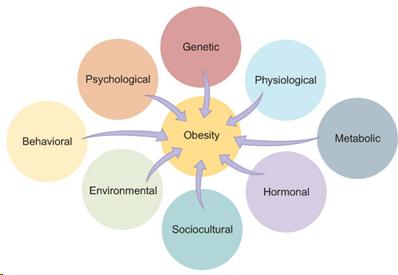
Factors associated with Overweight and Obesity

Maintaining a normal weight is a really complex and multifaceted challenge. So, we know that obesity is associated with many different factors. You can see here in the chart—psychological, genetic, physiological, metabolic, hormonal, sociocultural, environmental, behavioral. All of these aspects influence whether or not someone will become obese. And it's not-the obesity problem is not always solved by simply making a person eat less and exercise more. Certainly that can help, but there are many factors associated with overweight and obesity that we need to take into account when we're tackling this problem.
And so one particular thing I want to note here is that genes are involved; so your genetics, your predisposition for obesity, is involved in whether or not you will develop obesity or become obese or overweight. But, your genes do not solely determine your weight. A person can inherit a tendency towards being obese from their genes or their genetic makeup, but those genes are expressed (and by expressed I mean simply turned on or off) by interactions with lifestyle factors. So just because you have a genetic predisposition does not mean that you will automatically become obese or overweight. All of these factors, in combination with inactivity and constant access to high calorie foods, create a recipe for lots of obesity in this country. And so to be able to tackle the issue of obesity, you really have to be ready to tackle these complex and multifaceted issues.